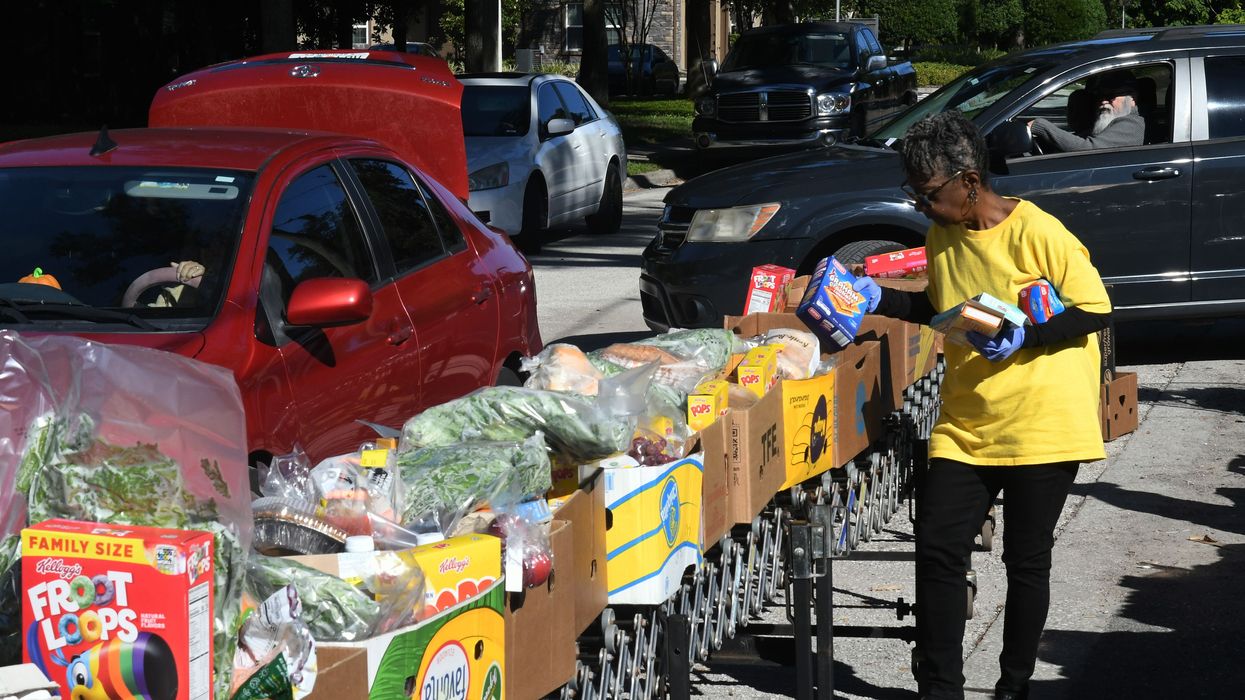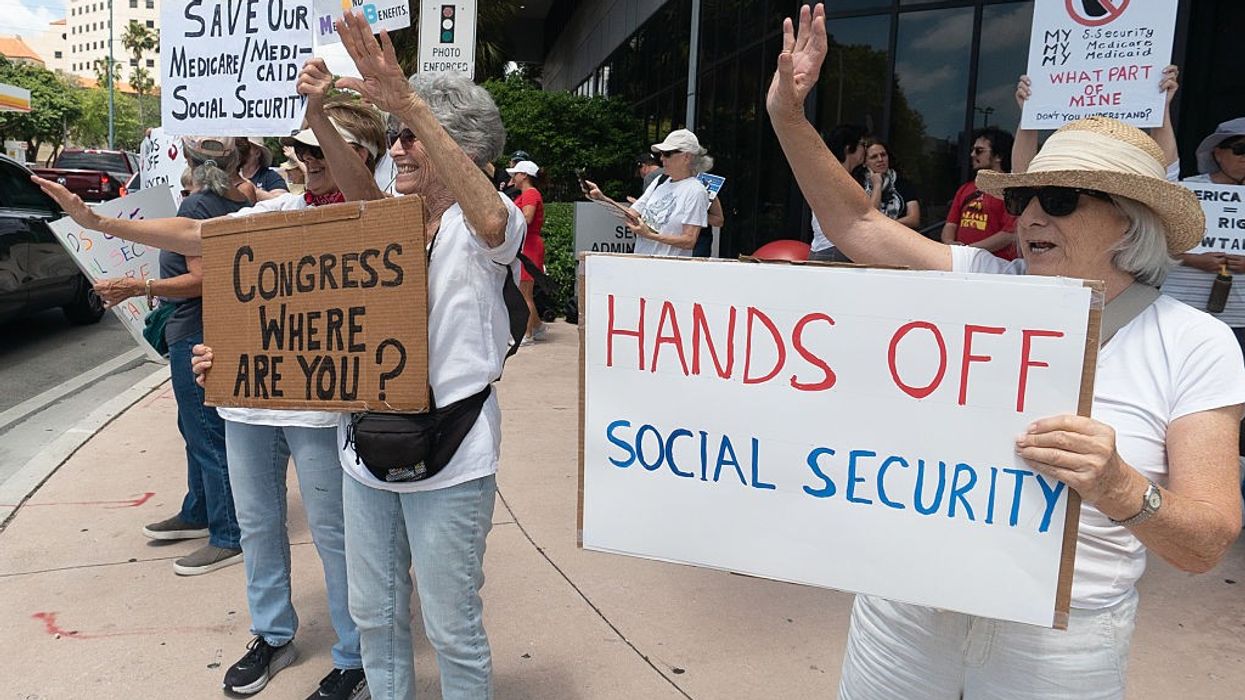How to Defeat the Pro-Suffering, Pro-Hunger Policies of Trump's GOP
Food insecurity has long been a feature of Republican politics, not a bug.
Once upon a time, in what increasingly feels like the fairy tale world of the 1970s, Democrats and Republicans agreed that hunger was immoral. This consensus was embodied by the collaboration to champion the Food Stamp Program between Senate Agriculture Committee leaders and political icons, namely Republican Robert Dole and Democrat George McGovern. They had essentially revived a farm support program launched under FDR during the Great Depression, turning it into a cornerstone of the anti-hunger struggle and eventually an entitlement program, in which anyone who qualified for benefits could receive them regardless of Congressional appropriations.
While America never evolved into a welfare state like many of our European allies, through food stamps and other nutrition programs, we were able to hold the line on the lowest common political denominator: that in the midst of abundance no one should starve. As the poor balanced precariously on the knife edge of poverty, the food stamp program helped to prevent people from falling into the abyss of unfettered capitalism. And it did so not by giving the poor cash to spend as they chose but through vouchers redeemable for food at grocery stores. In the process, the food stamp program also created a powerful ally in the food industry, for which these benefits came to comprise a significant portion of their sales. This partnership became a double-edged sword, protecting the program during times of crisis, while strengthening an industry heavily reliant on worker and environmental exploitation.
By the 1980s, much of the progress made in previous decades was under challenge. Ronald Reagan threw one million people off the food stamp program rolls, reviving the Calvinist trope that the poor were lazy, scamming, and otherwise undeserving of public aid. Globalization led to stagnating wages, faltering labor unions, and disappearing manufacturing jobs. In response, the anti-hunger sector — comprising advocacy organizations, churches, food banks, and other community-based groups — responded predictably to meet the food need through expanding food charity exponentially. In subsequent decades, as the Clinton Administration’s welfare reform legislation arguably further drove the expansion of the charitable sector, the anti-hunger sector also sought to increase benefits and remove barriers to participation in the food stamp program.
However, what the anti-hunger community largely failed to do was to develop an analysis of the underlying causes of the crisis and the long-term alliances to build power. In other words, anti-hunger groups could have mobilized their community to increase wages, facilitate unionizing, or regulations that would limit businesses’ ability to offshore jobs. Instead, they focused on food provisioning and bolstering nutrition assistance programs. And they partnered with corporate America, which donated food and money, served on their boards of directors, and lobbied together. In essence, the anti-hunger community had triangulated, positioning itself as neither on the right nor the left but as a morally-centered and centrist sector.
As a result of their efforts — which were compounded by the desperation of the Great Recession and the Covid-19 crisis — the food stamp program (now known as SNAP or Supplemental Nutrition Assistance program) participation swelled to some 42 million persons. SNAP evolved into a work support program, subsidizing low-wage employment, with over three-quarters of SNAP households having at least one employed adult.
Fast forward to November 2025, when the administration had been fighting tooth and nail not to fund SNAP during the government shutdown. But the conventional wisdom among the media explaining this resistance has been incomplete.
First, the press highlighted the cruel and callous nature of the administration, given that the immorality of hunger amidst abundance no longer motivates policy. The media pointed out MAGA’s belief in a dog-eat-dog world, bifurcated into winners and losers. These beliefs are the “roid rage” version of the Reagan-era meme of the Cadillac-driving welfare queen.
Second, the media called out the administration for using the poor as pawns in the political battle over the government shutdown. They interpreted the administration’s actions to be of a more tactical nature — that is, as leverage to defeat the Democratic Party in the shutdown battle (which was arguably successful).
While both of these observations hold much water, they are missing additional context. Consider the following:
- Trump’s “One Big Beautiful Bill” threatens the integrity of the SNAP program, forcing states to shoulder more of the costs, reducing future potential benefit increases, and tightening exemptions for work restrictions. According to the Food Research and Action Center, these changes will “increase hunger, push more families into deep poverty, and shift costs onto already strained state budgets.”
- The Administration ended $1 billion of food donations to schools and food banks through the termination of the Local Food Purchasing Act.
- USDA cancelled the purchase of $500 million of surplus foods, known as bonus commodities, for food banks. For decades, these commodities had been purchased to stabilize farming sectors and distributed to charitable organizations.
- In the international realm, the elimination of USAID and $128 million of food aid annually will “threaten decades of progress in reversing malnutrition.”
- Last month, the USDA announced it would no longer issue its annual report on the state of food insecurity, despite having done so since 1995. This report has been widely touted by academics as the gold standard in measuring hunger, and has been deployed by numerous other countries.
When viewed together, these actions certainly highlight an administration and political movement devoid of a moral compass on the matter of food insecurity. Yet, if we consider these shifts in conjunction with their other policies — such as ending collective bargaining for federal employee unions, restricting minimum wage in federal contracts and for certain workers, and virtually dismantling the National Labor Relations Board — it becomes evident that Trump’s pro-hunger policies are part and parcel of a decades-long shift in the balance of power to from labor to capital, harking back to at least the 1980s. Profoundly, Trump’s policies reflect a desire to reverse the social gains of the progressive and civil rights movements of the 20th Century.
In economic terms, anti-hunger programs such as SNAP, school meals, or food banking (which only provides one-ninth of the food of the SNAP program) have a complex relationship to wages. When benefits are tied to work requirements, these programs, along with Medicaid, enable businesses to avoid paying fair wages and provide health insurance, bolstering corporate profits. On the other hand, robust social assistance can drive up pressure to increase the minimum wage, as stronger safety nets theoretically keep more people, such as single mothers, out of the labor force (hence the One Big Beautiful Bill’s tightening of work requirements).
So, what’s Trump’s endgame for nutrition programs? He appears to be at odds with much of the American public, which does not buy into the cruelty of driving more people to desperation. Certainly, hunger has become a political football, highlighting his transactional nature. He appears to hold the erroneous but commonly held belief that the recipients of nutrition assistance are people of color, and if they’re not going to vote for him, then why should he help them?
Yet, to understand the deeper threat to this country, we also need to see the patterns behind his polices for what they are: an assault on progressive policies that reduce inequality, all as a means of shifting the balance of power even further towards plutocracy. Trump’s policies are not new; they follow the same neoliberal logic of the past 45 years, which has led to the rise of food banks. What is new is the brazen disregard for the poor, the callousness, and the disregard for the immorality of hunger. The veneer of care has been stripped off, the soft power of food aid trashed in favor of naked political gain.
This pro-hunger, pro-suffering movement will only be defeated when we build a mass movement — one that empowers the anti-hunger community to mobilize its tens of millions of donors and recipients, not to retreat into Bush’s “kinder gentler nation,” but to demand a new America defined by an equitable distribution of wealth.
This story was reprinted with permission from The MIT Press Reader. It was written by Andrew Fisher, the author of “Big Hunger: The Unholy Alliance Between Corporate America and Anti-Hunger Groups.”


